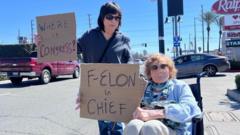Tesla facilities across the United States have emerged as sites of protests and vandalism, spurred by backlash against Elon Musk's political engagement with the Trump administration. While many "Tesla Takedown" demonstrations have remained largely peaceful, some incidents have turned destructive, including reports of fires set at showrooms and charging stations in Colorado and Massachusetts last week.
Over the weekend, six arrests were made in New York after protesters occupied a Tesla showroom, underscoring the intensity of the demonstrations. A trend of Cybertruck vandalism has also surfaced across the country, with some owners openly defacing their own vehicles in protest against Musk. One notable incident involved a woman who showed up to a Burbank protest with expletives directed at Musk scrawled on her Model X sedan, and another vehicle sported "Anti Elon Tesla Club" stickers.
The protests reflect a deeper unease about Musk's influence on U.S. governance. Following President Trump’s appointment of Musk to spearhead the cost-saving task force, Department of Government Efficiency (Doge), critics have voiced concerns over Musk's purported power in Washington, dubbing him "President Musk." Protesters wielded signs reading "Deport Elon" and "Boycott Swasticar," drawing connections between Tesla and fascism.
Elon Musk's political involvement has disillusioned some previously loyal Tesla buyers. Karen Rabwin, a protester in Burbank, recently traded her Tesla for a Cadillac, expressing a need to align her purchases with her principles: “It was embarrassing… How could I drive that car?” Celebrity figures like Sheryl Crow have also publicly distanced themselves from Tesla, reinforcing this movement.
In response to dissent, Musk took to social media, sharing videos showcasing customer satisfaction with Tesla products. Despite these efforts, a significant segment of the public is growing increasingly frustrated with his perceived entanglement in government dealings that may favor his business operations. Reports emerged alleging Musk tried to secure modification of a $2.4 billion telecommunications contract with the Federal Aviation Administration in favor of his SpaceX’s Starlink.
Critics maintain that Musk’s influence is detrimental to both the economy and the democratic process, prompting many to appear at Republican town hall meetings to denounce job cuts and Musk's overarching control. Meanwhile, Republican leaders, including House Speaker Mike Johnson, have urged their party members to stabilize events and dismiss claims of organized protests as baseless.
The rising sentiments against Tesla not only threaten Musk's legacy but may also impact the company's market value, with shares reportedly falling back to pre-2020 levels amidst the political backlash. As the wave of protests continues, the discord between Musk, his supporters, and a faction of disaffected Tesla owners persists.






















